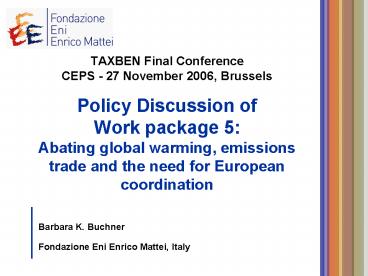Barbara K' Buchner PowerPoint PPT Presentation
1 / 13
Title: Barbara K' Buchner
1
TAXBEN Final Conference CEPS - 27 November 2006,
BrusselsPolicy Discussion of Work package
5Abating global warming, emissions trade and
the need for European coordination
- Barbara K. Buchner
- Fondazione Eni Enrico Mattei, Italy
2
Overview
- Climate Policies and Economic Growth by Alho, K.
(ETLA) - Post-2012 Climate Policies A Simulation Study
with WorldScan by Boeters, S. (CPB), Verweij, G.
(CPB) - Taxes and Tradable Permits in the EU to curb CO2
Emissions Efficient and Transitional Climate
Policies A Combined Analysis Using PACE and
WorldScan by Böhringer, C. (ZEW), Boeters, S.
(CPB), Moslener, U. (ZEW) - Post-Kyoto Climate Policies From G8 to L20 by
Böhringer, C. (ZEW), Moslener, U. (ZEW) - Efficiency Losses from Overlapping Economic
Instruments in European Carbon Emissions
Regulation by Böhringer, C. (ZEW), Koschel, H.
(ZEW), Moslener, U. (ZEW) - The EU-ETS and existing energy taxes by
Veenendaal, P.J.J. (CPB)
3
Climate Policies and Economic Growth
- Main question
- What are economic effects of climate policies?
- Important policy question (US position, Stern)
- Main insights for policy
- Technology matters
- Price of tradable permit significant role
- Optimal subsidy to RD activity in clean energy
technology quite high - But consider that reallocation of resources from
energy-intensive sectors to those that use other
inputs is difficult
- CO2 different
- Indeed, leakage not that bad
4
Post-2012 climate policy - Background
- Broad participation on climate change control is
hard to achieve because of - Public good free-riding incentives
- Large economic and environmental structural
asymmetries among world regions - Absence of supra-national authority
- Difficulty of negotiations
- Low environmental effectiveness of Kyoto Protocol
- Look for incentives
5
Post-2012 Climate Policies
- Main question
- How to extend climate policies?
- Important policy question currently negotiations
- Main insights for policy
- 3 separate markets expensive
- Link would enable efficiency gains, but there are
winners losers and indirect effects - CDM can set incentives (FSU?)
- Stand-alone policy of US might benefit EU
- essential to identify incentives for each country
to find common ground for negotiations
6
Efficient and Transitional Climate Policies
- Main question
- What is trade-off between allocative / overall
efficiency and distributional considerations /
political feasibility? - Important policy question wait see or act?
Turning point? Is there a point of no return? - Main insights for policy
- Political feasible transition scenarios
initially lower than efficient abatement levels,
with more pronounced temperature increase?
requires sharper emissions decline later on - Stringent targets infeasible / expensive
- Obstacle for future climate negotiations
- go beyond political feasibility
7
From G8 to L20 a smaller negotiation group
- Main question
- Is negotiation in a smaller group easier/more
efficient? - Important policy question are there more
participation incentives for such an approach? - Main insights for policy
- In line with theoretic considerations and
political reality - But Trade-off limited ? global coverage? may
not be easily agreed upon (costs) - Key role of equity
- Difficult but essential to cover all countries
policy proposal regional/subglobal climate blocs - involve all, binding / non-binding elements
8
EU Carbon Policy Overlapping Economic
Instruments
- Main question
- Potential efficiency losses from co-existence of
emission taxes and emissions trading in EU? - Important policy question are there distortions?
implications for EU ETS design / climate policy? - Main insights for policy
- Price-based mechanism within quantity-based
scheme unlikely to alter environ. effectiveness
increases overall EU compliance costs - Carbon tax for non-trading sectors
- Careful handling of carbon/energy taxes in
trading sectors
- Portfolio of climate policy instruments yes
- But careful design
9
EU ETS and existing energy taxes
- Main question
- Interactions between EU ETS EU energy taxation
- Main insights for policy
- Taxes differ strongly between countries and
sectors mainly political reasons for energy
taxes, almost no environmental considerations - Existing energy taxes distortive ? power of
rearranging existing taxes - EU ETS given energy taxes, substantial extension
unlikely to increase efficiency - EU ETS auctioning can increase economic welfare
- CO2 emission reductions often as by-product of
other (mainly energy-related) concerns - Portfolio approach crucial
10
Summary The Facts
- Speed of climate change alarming, unexpected
- Increasing evidence for potentially large impacts
of climate change - Increasing evidence for high costs or even
infeasibility of reaching stringent targets - Need to involve as many countries as possible
- CO2 different (indeed, leakage not that bad)
- CO2 emission reductions often as by-product of
other (mainly energy-related) concerns - Existing energy taxes distortive
- Use insights of papers to set incentives for
participation
11
Summary Implications for post-2012
- Difficult but essential to cover all countries
regional / subglobal climate blocs - Involve all, binding / non-binding elements
- Essential to identify incentives for
participation and compliance - Better coordination / institutions
- Portfolio approach to climate policyBut careful
design - Linking of ET markets important but complicated
- first step link CDM to ET markets
- Global participation, but differentiated
commitments - Improvement of energy system
- Go beyond political feasibility!
12
Summary Implications for EU climate policy
- Essential to identify incentives and impacts for
each country / sector - Difficult but essential to cover all sectors
- Substantial extension of EU ETS not recommended
due to existing energy taxes - Better coordination
- Portfolio approach to EU climate policyBut
careful design - Linking of ET markets important but complicated
(current evidence from EU ETS) - first step strengthen link to CDM
- One more recommendation for auctioning
- Go beyond political feasibility!
13
(No Transcript)

